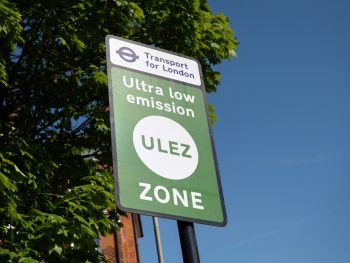London Ultra-Low Emission Zone expansion has generated extra £94m for TfL
Last year’s expansion of London’s Ultra-Low Emission Zone (ULEZ) generated some £93.6m of additional revenue from drivers of non-compliant vehicles in the first eight months.

The extended ULEZ went live on 25 October 2021
RAC analysis of Transport for London (TfL) figures since the extended zone went live shows an estimated 1.9 million vehicle journeys in the capital are deemed non-ULEZ compliant each month, compared to just 329,527 in the original zone. Up until June 2022 – a period of eight months – the scheme had resulted in £112.5m worth of revenue from those vehicles required to pay the £12.50 charged, compared to revenues of just under £19m between February and September 2021 prior to the ULEZ expansion.
These figures don’t include TfL revenues for penalty charge notices (PCNs) issued to drivers for non-payment of the ULEZ charge.
Data shows that in the first eight months after the expansion, an estimated 1.6 million PCNs were issued, compared to just 253,357 in the eight months prior to the boundary changes.
Based on the £160 fine amount (£80 for early payment), the RAC estimates the potential income from PCNs issued to drivers in the expanded zone is between £130.9m and £261.9m, compared to between £20.3m to £40.5m in the eight months in the original central London boundaries.
Prior to expansion, around 13.1% of all vehicles were deemed non-compliant with emission standards. After expansion, this fell to 6.9%. The proportion of non-compliant vehicles issued with a PCN averaged 9.6% within the original zone, rising to 14.2% in the first two months of the expanded zone before falling back to the same average proportions that were prevalent in the old zone.
The RAC also highlighted that around three-in-10 (28.5%) non-compliant vehicles were not required to pay the ULEZ due to various discounts and exemptions.
Plans to expand the ULEZ further in 2023 will bring added burdens for drivers; Mayor of London Sadiq Khan has asked TfL to consult on proposals for expanding the ULEZ on 29 August 2023, responding to evidence showing further measures are required to reduce toxic air pollution, tackle the climate emergency and cut congestion in the capital.
Khan has also said that the long-term and fairest solution to these challenges will ultimately be smart road user charging.
The RAC has called for any further ULEZ expansion to be structured with support for drivers and businesses hardest-hit.
Head of roads policy Nicholas Lyes said: “While we accept that action is needed to reduce toxic emissions from vehicles, the cost-of-living crisis is hurting drivers in the pocket and there is a risk that further enlarging the zone will be hugely costly for those with older vehicles who can least afford to change them for something newer.
“As it is, RAC research suggests drivers are holding on to their vehicles for longer, so there is a real risk that more people with non-compliant vehicles will be forced to pay a charge they can ill afford to.
“We would encourage the mayor to take a pragmatic approach and redouble his efforts to support lower-income families and businesses with non-compliant vehicles with a targeted scrappage scheme ahead of any expansion plans.”












